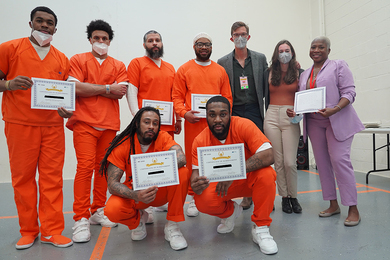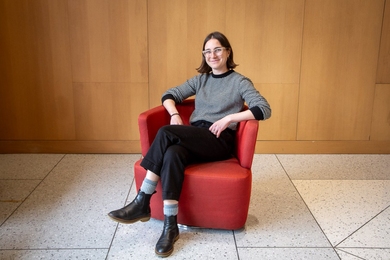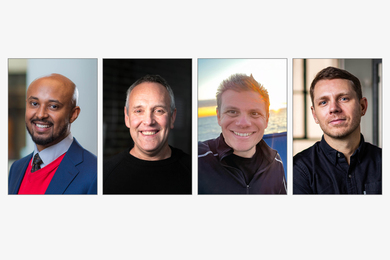President Charles M. Vest outlined MIT's accomplishments, challenges and vision for the future at the Cambridge Rotary Club's weekly meeting last week at Howard Johnson's Hotel on Memorial Drive.
President Vest was introduced by Cambridge Mayor Francis Duehay while Sarah Gallop, co-director of the Office of Government and Community Relations, presided over the meeting as the president of Cambridge Rotary this year.
"When I asked Sarah what she thought I should talk about today, she had a ready answer: 'Just tell them what's on your mind.' On balance, my thoughts about MIT's past and future disclose an MIT agenda that, while complex and dynamic, has also remained remarkably consistent over time," Dr. Vest said.
Among the topics he discussed were:
HISTORIC MISSION
"Since its founding by William Barton Rogers in 1861, MIT has sought to advance knowledge and educate students in science, engineering and other areas of scholarship -- and to bring this knowledge to bear on the world's great challenges.
"These objectives are informed by a strong commitment to national and community service, and they are enriched by our dedication to creating a diverse and supportive campus community."
STRATEGY
"MIT's mission was made substantially easier in the last half of this century by a clear federal policy of investment in science- and technology-based education and research.
"Throughout the 1960s, '70s and '80s, research grants provided at least half of MIT's annual campus operating revenues -- and sometimes as much as 60 percent. Far and away the largest contributor was the federal government. By the mid-1980s, however, that began to change. In 1990, when I arrived at MIT, the growth in federal research funds available to US universities had stagnated, and was barely keeping pace with inflation.
"It was clear to me that I had an opportunity, acting in close cooperation with other leaders from academia, industry and government, to help rebuild the national consensus about the value of investments in education and research."
WASHINGTON PRESENCE
"In 1991, we established a Washington office. Our goal was not to lobby for funding specific to MIT, but to help federal decision-makers in both the executive and legislative branches to understand the value of public investment in US research universities.
"Working closely with other universities and with national advocacy groups, we have undertaken a systematic effort designed to bring home the fact that every dollar invested in university-based R&D does double duty. These investments not only produce the research advances that drive our economy and improve our quality of life, but they also help to create the next generation of talented scientists, engineers and managers...
"Together with about 60 other research universities, including Harvard, and almost 300 organizations and individuals, we have helped create an effective advocacy organization called The Science Coalition. We have also provided increased public service by operating a successful and popular series of annual seminars for Congressional staff held here in Cambridge."
CAMPUS DEVELOPMENTS
"Over the past five years, we have revamped many of our services, including our internal mail system, custodial and maintenance services, publications services, printing, our purchase of office supplies and inventory management functions.
"Perhaps our most important managerial innovation, however, has been the campus-wide adoption of a comprehensive financial management software program called SAP. Over time, SAP will allow us to reduce costs for financial transactions and improve our auditing and accounting functions. Along the way, SAP has also helped us deal with our so-called Y2K problem -- and, believe me, that is something for which I am especially grateful as we approach the end of the decade.
"Our students, of course, have paid little attention to these important behind-the-scenes improvements. There is one change, however, which they have noticed -- and greatly applauded. Last year, we consolidated all of the various student-related services -- bursar, registrar, financial aid administration, etc. -- into a single Student Services Center with staff cross-trained to handle any inquiry or transaction.
"The Center has been a major hit with both undergraduate and graduate students, and is a highly visible symbol of our efforts to create an efficient, user-friendly campus environment."
COMMUNITY RELATIONS
"MIT's community relations efforts reflect our commitment to striking a balance between, on the one hand, being good citizens of Cambridge, and on the other, assuring that MIT continues to fulfill our missions in education and research.
"I fully recognize that, on occasion, this means that we may disagree with the city on matters important to both of us. But, even when conflict does occur, I believe our history of working together provides a firm foundation for what, on balance, remains a healthy and cooperative 'town-gown' relationship.
"Nowhere is this relationship more in evidence than in MIT's engagement with the Cambridge public schools. I am very proud of this long-standing partnership, and of the positive impact that I believe it has had on the Cambridge school system (and on our students, faculty and staff).
"Members of the MIT community are engaged in a wide variety of volunteer programs involving the teaching, mentoring and tutoring of Cambridge youth. Also, MIT volunteers and Cambridge teachers regularly team up on activities related to curriculum, technology and pedagogical techniques. Working with the City of Cambridge on educational advancement has been, and will remain, a priority for me and for the Institute as a whole...
"MIT is also an incubator that spawns many new enterprises that add jobs and tax revenues to the city's economic base. In fact, there are about 150 such businesses in the city, founded by MIT graduates or faculty, and accounting for some 14,000 jobs."
THE FUTURE
"I believe that the next few decades will see enormous advances in understanding neuroscience, the brain and the mind. We will begin to find therapies and cures for genetically based mental and emotional diseases similar to those that have emerged in recent years for many physical diseases. We will be leaders in this great endeavor.
"Modern molecular biology and genomics will become a new scientific base for engineering, especially in the design of environmentally friendly production of materials. We are reorganizing part of our School of Engineering to lead this change.
"MIT is placing, and will place, great emphasis on the daunting problems of the Earth's environment and on wiser use of energy and materials to enable the sustainable development of societies and economies around the world. We must do this in partnership with industry. In the 21st century good environmentalism will be good business.
"We will play a role in understanding and guiding the development of new organizational, management and entrepreneurial enterprises of the future. The goal is innovation to gain efficiency and produce jobs and wealth."
A version of this article appeared in MIT Tech Talk on January 13, 1999.





